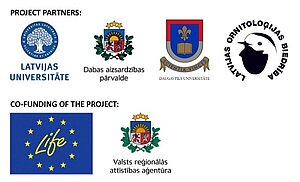The Institute of Biology of the University of Latvia is launching a project on endangered and specially protected species – LIFE FOR SPECIES
In order to inform the general public about the aims, objectives and possible results of the project LIFE FOR SPECIES, on 4 March this year, at 11:00, there will be an online project launch seminar on the Zoom platform. All interested participants are invited to apply by filling in this application form by 1 March. A link to participate in the online seminar will be sent to the email address provided in the application. A detailed seminar programme will follow shortly.

The aim of the LIFE FOR SPECIES project is to update the list of protected and endangered species, to develop scientifically-based criteria for assessing the degree of endangerment of species and determining the conservation status, as well as to prepare proposals for relevant changes in regulations. The current legislation governing specially protected species and micro-reserve species was issued about 20 years ago. Since then, scientific information has accumulated on the occurrence of species, threatening factors, as well as changes in the Latvian economy. In order to balance the interests of nature protection and economic activity, it is necessary to develop scientifically-based criteria for the definition of threatened species and to update the regulations that ensure the protection of species.
In order to achieve the aims set within the project, several objectives have been set:
- to evaluate and update the list of specially protected species, as well as to evaluate the species according to the criteria defined by the The International Union for the Conservation of Nature (IUCN);
- to prepare updated drafts of legislative amendments;
- to prepare detailed information regarding specially protected species, including data regarding the occurrence of the species, biology, ecology and the necessary measures for their protection. The project website is intended for gathering information, as well as printed publications – species data sheets or Red Book;
- to improve the nature data management system OZOLS;
- to strengthen the competence of species protection experts and decision-makers by organising trainings and seminars;
- to promote public understanding and involvement in the protection of species and the preservation of Latvia's biological diversity.
The project is co-financed by the European Commission's LIFE Programme and the National Regional Development Agency. The project budget is EUR 2 706 291, of which EU funding makes up 55%. The project will run from 1 December 2020 to 31 December 2024.
The LIFE programme is the European Commission's financial instrument for the environment and climate, which aims to promote, update, develop and implement EU environment and climate policy by co-financing projects with European added value. The LIFE programme has been operating in Latvia since 2001 and with its support 50 projects in the field of environment and climate have been successfully implemented, acquiring more than EUR 40 000 000.
More than 20 years ago, the Institute of Biology of the University of Latvia (then the Institute of Biology of the Latvian Academy of Sciences) launched one of the first LIFE projects in Latvia – "Rare and endangered species of plants and animals (Red Data Book of Latvia)", project No.: LIFE94 TCY/LV/0579, within the framework of which the list of endangered and protected species was compiled, a total of 706 species, as well as 5 volumes of the Latvian Red Data Book on various species groups were published.

The Project “Threatened species in Latvia: improved knowledge, capacity, data and awareness” LIFE19 GIE/LV/000857 LIFE FOR SPECIES is implemented with the financial support of the LIFE Programme of the European Union and Latvian State Regional Development Agency. This publication reflects only authors’ view. Neither CINEA (European Climate, Infrastructure and Environment Executive Agency) nor European Commission are responsible of any use that may be made, or the information contained therein.
